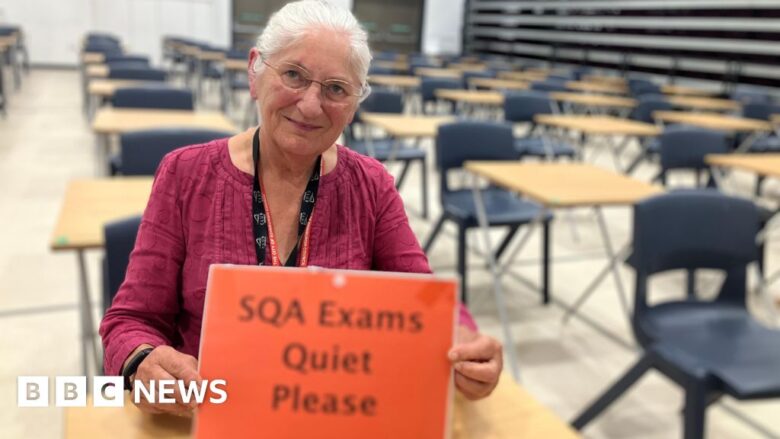Article information
- Author, Joanne MacAulay
- Role, BBC Scotland News
When the final examination of the Scottish 2024 exam diet – Gaelic Nat 5 listening is over later – candidates, teachers and parents across the country will breathe a sigh of relief.
So is the army of people who have to make sure the logistics run smoothly and that no one cheats.
They are supervisors who carry out all aspects of Scottish Qualifications Authority (SQA) assessments for six weeks each spring in over 500 schools and colleges.
Dr Alex Laird is one of them.
The end of this year’s exams means the end of a quarter of a century of supervising pupils who pass the higher and national five.
Dr. Laird is head invigilator at Portobello High School in Edinburgh, where her main focus for 25 years has been ensuring candidates do their best.
“You have to have good organizational skills, an eye for detail and it helps a lot if you have a very good memory,” she said.
“Candidates should simply be able to come and take the exam without any excitement or upset.”
He says many people assume the job is a case of marching up and down to keep people from cheating. However, complex logistics are also associated with this.
And Dr Laird revealed that in her experience with thousands of candidates, she can count the number of people she’s caught cheating on one hand.
‘Special conditions’
She told BBC Scotland News: “There have only been three undisputed cases of deliberate breach of the rules.
“One was in a modern languages exam where I thought one candidate seemed to be looking up an awful lot of words. [in a dictionary] starting with A or B. But it really turns out they have notes tucked in there.
“The most recent was a mobile phone in someone’s pocket, which is apparently completely against the rules. Not only was it in their pocket, it was switched on.”
She added that these incidents were very rare and the vast majority of candidates were polite, grateful and followed the rules.
Another big change and an additional challenge is the increase in the number of candidates who need special conditions to pass the exams, such as using IT, getting extra time or a separate room.
Dr Laird said: “It’s no longer the idea that everyone goes to the school hall.
“This year we had 22 rooms on the road for Nat Five English.
“Quite a few students also need their written exam to be slightly different from the standard version – for example, in a specific font or enlarged print or colored paper.
“Some schools may need it to be in Braille. So you have to know exactly where the candidate is going to be because you have to get them the right paper.”
Dr. Laird also trains other supervisors and advises on their duties – even down to their footwear.
She said: “Squeaky shoes would have driven me absolutely crazy when I was a candidate.
“Similarly, jingling coins or keys in their pockets are a no-no.
“The role of the warden is to be there to try and prevent any problems, not cause them.”
Dr. Laird said it’s bad to stand or sit too close to a candidate.
She added: “You should be moving.
“We’re in charge of making sure the candidates stick to the rules, and that means the supervisors have to stick to the rules, too.”
Wardens also have to deal with the occasional medical incident.
“We had one spectacular nosebleed a few years ago.
“A member of staff had to sit with gloves on and copy [the answers]out because you couldn’t even put paper in the copier.
“Setting the right temperature in examination rooms can be really difficult.
“Someone is close to passing out from the heat and I’m afraid people are more than just sick and sick.
Noise can also be a distraction to deal with.
“In the summer you can mow the grass or mow outside.
“One early May, in the mating season, a couple of pigeons on the roof of the hall were very evidently talking, let’s say!
“It couldn’t be ignored and all the candidates in the hall were very much aware of it!”
Dr. Laird is handing over his duties to retired math teacher Bill Webster, who has been keeping watch for seven years.
He believes this role is crucial to the smooth running of the exam process.
“We are a cog in the wheel, and if the cog is missing, the whole thing stops.
“I think you’re more aware of the minutiae of the job and the things you have to remember from year to year.
“I enjoy organizing things. I worked in education for a long, long time and it seems to me that this is a continuation.”
He added: “At the end of May, we are tired and glad that it has ended and gone well and we hope that any issues that have arisen have been resolved to the satisfaction of all involved.”
Jacqui Faulds, Head of Commissioned Management at SQA, said: “Invigilators play a vital role in delivering the annual Dietary Plan.
“Simply put, without their experience and input, the Trials in Scotland would not have taken place.
“We are indebted to colleagues like Alex and Bill who give up their time each year to ensure that students have the best possible opportunity to demonstrate their knowledge and understanding on exam day.”
When he retires, Dr. Laird is now looking forward to seeing a little more daylight from the end of April to the end of May, but she will miss her colleagues and candidates.
She said: “It’s satisfying because you know you’re helping the next generation of young people get to the point where they can go out into the world and get on with what they want to do.
“Achieving the desired results in an exam is a huge boost to self-confidence.
“Probably the best part of the job is knowing that people have done it for us and you’re paying for it.”




